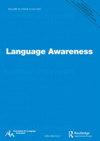Situation-model representations of conflicting textual information in L2 readers: the effects of prior beliefs and L2 proficiency
IF 2.2
2区 文学
0 LANGUAGE & LINGUISTICS
引用次数: 0
Abstract
Abstract In a knowledge society characterized by an abundance of information sources that present conflicting perspectives on socio-scientific controversies, it is extremely important for readers to construct effective mental models of such controversies. Nevertheless, readers’ mental representations of controversial information are assumed to be biased towards their pre-existing beliefs (text-belief consistency effect). This study extends earlier research on the effect to L2 reading contexts and examines whether L2 readers’ prior beliefs affect their situation-model representations of documents that present opposing standpoints on an established controversy in language education: inductive vs. deductive approaches. Additionally, we examined whether the readers’ strength of situation-model representations is affected by their proficiency level and whether proficiency moderates the effect. Fifty-eight readers read texts that presented conflicting perspectives on the controversy. A recognition task was used to assess the strength of their situation-model representations. The results revealed that readers’ mental representations of the documents were biased towards the perspectives that aligned with their pre-existing beliefs on the controversy. The results further revealed a strong significant effect for L2 proficiency on the strength of the situation-model representations of the texts. However, proficiency failed to moderate the text-belief consistency effect that readers displayed when reading the controversial textual information.二语读者冲突语篇信息的情景模型表征:先验信念与二语水平的影响
在知识社会中,信息来源丰富,对社会科学争议提出了相互矛盾的观点,对读者来说,构建有效的这种争议的心理模型是极其重要的。然而,读者对有争议信息的心理表征被认为是偏向于他们已有的信念(文本信念一致性效应)。本研究将先前关于二语阅读语境影响的研究扩展到二语阅读语境,并探讨了二语读者的先验信念是否会影响他们对在语言教育中一个既定争议中呈现对立立场的文件的情境模型表征:归纳与演绎方法。此外,我们还考察了读者情境模型表征的强度是否受到其熟练程度的影响,以及熟练程度是否调节了这种影响。58名读者阅读了对这一争议提出不同观点的文章。一个识别任务被用来评估他们的情境模型表征的强度。结果显示,读者对文件的心理表征偏向于与他们先前对争议的看法一致的观点。结果进一步揭示了二语熟练程度对文本情境模型表征强度的强烈显著影响。然而,熟练程度并不能调节读者在阅读争议文本信息时所表现出的文本信念一致性效应。
本文章由计算机程序翻译,如有差异,请以英文原文为准。
求助全文
约1分钟内获得全文
求助全文
来源期刊

Language Awareness
Multiple-
CiteScore
3.70
自引率
10.00%
发文量
18
期刊介绍:
Language Awareness encourages and disseminates work which explores the following: the role of explicit knowledge about language in the process of language learning; the role that such explicit knowledge about language plays in language teaching and how such knowledge can best be mediated by teachers; the role of explicit knowledge about language in language use: e.g. sensitivity to bias in language, manipulative aspects of language, literary use of language. It is also a goal of Language Awareness to encourage the establishment of bridges between the language sciences and other disciplines within or outside educational contexts.
 求助内容:
求助内容: 应助结果提醒方式:
应助结果提醒方式:


